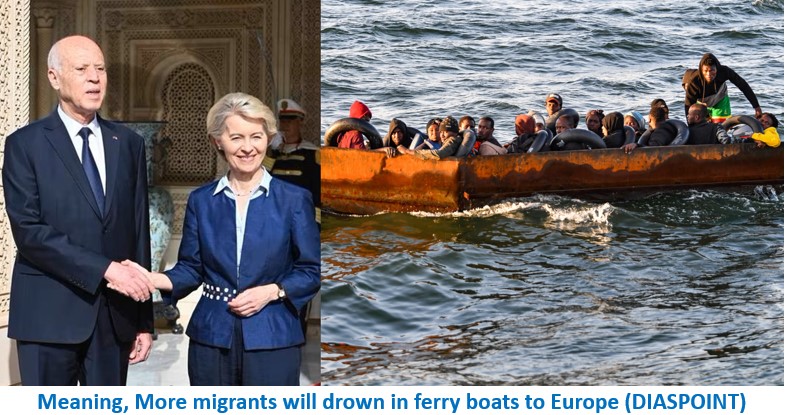EU offers Tunisia pipelines and broadband in exchange for migration pact
Post By Diaspoint | July 21, 2023

Analysts say agreement will do little to stem migration and overlooks human rights abuses
European Commission chief Ursula von der Leyen and Tunisia’s President Kais Saied on Sunday signed an agreement in which Brussels offered to strengthen economic ties with Tunis in return for it fighting irregular migration to Europe.
The migration aspect of the package has been heavily criticised by analysts who say that it will do little to stem the flow of migrants and overlooks human rights abuses.
EU officials, on the other hand, have said that the package is a broad one that will boost the ailing Tunisian economy. It includes investments in the digital sector, transport and green hydrogen.
Here, The National breaks it down.
How serious is the migration issue with Tunisia?
Tunisia lies about 130km from the Italian island of Lampedusa, and has long been a departure point for migrants risking perilous sea journeys on makeshift boats in hopes of reaching Europe.
But trying to get into Europe via the Mediterranean Sea is highly dangerous.
The International Organisation for Migration has said 2,406 migrants died or disappeared in the Mediterranean in 2022, while at least 1,166 deaths or disappearance were recorded in the first half of 2023.
Figures vary according to the routes taken.
The number of migrants that go via the Western Mediterranean route, which includes Tunisia, decreased by six per cent year on year in the first six months of the year, according to the European border and coastguard agency Frontex.
Migrants come mostly from Algeria and Morocco.
The decrease may be attributed to weather and also to Tunisian authorities “stepping up their activities” against illegal migration, according to an EU official who spoke to journalists in Brussels on Monday.
“Interception rates have increased quite significantly so we see a structural trend which is definitely heading in the right direction of avoiding departures,” they said.
The most active route was via the central Mediterranean, where arrivals increased by 137 per cent in the same six months.
Illegal migration has caused political tension in both Europe and in countries like Tunisia, where Mr Saied accused “hordes” of migrants from sub-Saharan Africa of a “plot” to change the country’s demographic make-up.
Far-right Italian Prime Minister Giorgia Meloni has vowed to stem illegal migration and has limited the number of operations of charity rescue ships.
What does the agreement say about migration?
Read More from original source
